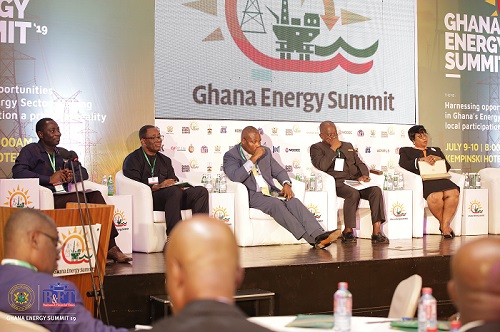To turn Ghana into a petroleum hub in the West Africa sub-region with state-of-the-art refineries, storage facilities, pipelines and efficient transportation facilities, the private sector must be part and parcel of the idea’s formulation, implementation – and even allowed to be managers of the hub, panelists at the 2019 Ghana Energy Summit have noted.
“If you want the private sector to participate, then politicians should stay out,” Mr. Kwame Jantuah, CEO of African Energy Consortium said, as part of the first panel discussion on the theme ‘Ghana’s Petroleum Hub Project: The Dream, Opportunities and How to get There’.
“This concept of a hub, how many private sector players are part of the thinking process? If you do not start now to get the private sector interested so as to understand the policies that are coming out, how do you expect the private sector to participate? We must actively involve the private sector right from the get-go,” he added.
Mr. Jantuah, a lawyer and energy expert, noted that even though politicians are needed, the country will be best served if the private sector is allowed to manage the hub with government providing policy and regulatory guidelines.
“Yes, we need the politicians to set the line; but we need the private sector to be part and parcel of it from the word go. We are talking about refineries, petrochemical plants, light industries; which private sector players can do any of these? If we do not sit down and put these things on paper and invite the private sector in, we will start this thing and, unfortunately, it will end due to the kind of politics we practice in this country,” he cautioned.
Ghana has been hard at work trying to turn the country into the sub-region’s petroleum hub by 2030. Expected to cost US$60billion, the hub – which is expected to be established in the Western Region – will include refineries, petrochemical plants, power plants, light industry, waste and water treatment facilities, storage facilities, and business and residential centres.
With a location scouted and feasibilities being undertaken, industry analysts believe that the hub should not just create jobs but also establish a sustainable means of refining local crude, create the environment for synergies between public and private to flourish, and unify all three spheres of the petroleum industry: upstream, midstream and downstream.
Mr. Isaac Osei, Managing Director of the Tema Oil Refinery (TOR), also stressed that the business of government is to create the enabling environment needed for the private sector thrive.
“I believe that the business of managing enterprises is not in the domain of government. Government’s role is to create an enabling environment that enables private sector operators to succeed. Also, government is to provide the regulations that govern these entities.
“I’d be very happy to see investment in TOR from private equity, so that they can take over the place and run it so I can exit quietly. That is the thing we should be thinking about. Investment should be done by both private and public; but management of the system, I believe, the private sector is best-equipped to do that,” he added.
Mr. Osei also pointed out that currently there are a lot of synergies that can be capitalised on, even with the hub yet to take off. To him, institutions such as Ghana Gas and TOR are already working hand in hand to produce premium petroleum products for the local market.
With respect to training, TOR, he said, has become a training institute for a pool of engineers all over the world. “In more recent times, we have cooperated with MODEC to train many of their young engineers for a period of six months. There is that linkage which I believe we must harness,” he said.S
He therefore called for more investment in TOR to revamp its facilities. “TOR today is as good as any refinery, it’s just that we do not have enough resources to stay in continuous operation, and that is why it has made losses,” he added.
Mrs. Abigail Asolange Harlley, CEO of AI Energy, noted that the vision to establish a petroleum hub is a laudable one and government needs to be commended for it. To her, when actualised the value it accrues will be of enormous benefit.
“The first benefit will be the creation of synergies that will be formed. These synergies include joint ventures, strategic collaborations, public and private partnerships: private and private partnerships will go a long way to help the private sector,” she said.
She urged government to offer tax-breaks to private sector players to spur them into taking part in making the dream a reality. Also, she believes that a regulatory institution that enables government to realise the full vision of a hub is needed.
“A hub of this nature should see government put in place a coherent, comprehensive and clearly-defined regulatory framework that will spell out the roles of both government and private sector. Also, a regulatory authority must be established to be mandated with a one-stop service for the entire sector, to ensure the vision of government is achieved seamlessly,” she added.
Mr. George Mensah Okley, CEO of BOST, noted that for the private sector to be fully committed to the project, transparency is required. He believes that with the vision of the hub currently at policy and discussion level, what’s needed is for a state agency to be deployed to handle the process.
“Give that agency a timeline, and if we need to turn it into a public institution via the stock exchange, then private sector players can invest in that vehicle,” he said.
Source: B&FT Online





